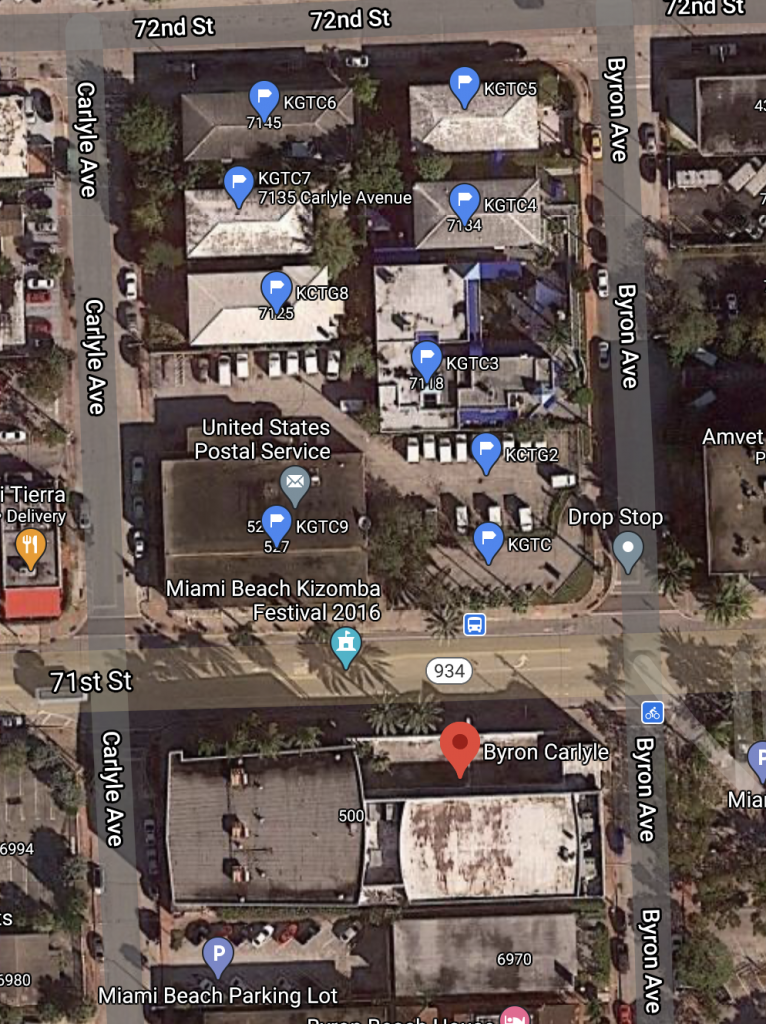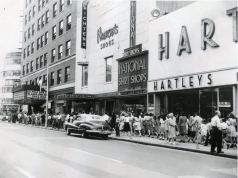(Para leer la version en español, haga clik acá)
Manning Salazar still remembers when he arrived with his grandparents at the doors of the Byron Carlyle theater, located on the north side of Miami Beach, to see the premiere of the movie “Star Wars.”
“During the summer they would have double features, they would show western movies and it would be packed with kids,” said Salazar, who now leads the committee to preserve the Byron Carlyle. “It was like a neighborhood thing… This was a time when North Beach was entertaining. It was the most developed part of Miami Beach, where everything was happening.”
For months now, the Miami Beach commission has been debating a plan to demolish the existing theater and build a $45 million building with seven stories of micro-apartments, a ground-floor division of three retail spaces and a fourth space, which the city would use for a cultural center.
The renovation plan has ignited a debate between two major developers — KGTC LLC. and Menin Hospitality — residents, and city commissioners. While the developers portray their plan as a beneficial change for the neighborhood, others see it as a giveaway of public land to private contractors in order to build small apartments with little space left for entertainment.
On February 24 at 5 p.m., the Miami Beach commission will meet to hear how the developers plan to satisfy residents who are asking the city to make good on the promise of reserving the space for the arts.
Developers have asked the city, which currently owns the theater, to lease the land for 99 years at $1 a year; they also want the city to pay for demolishing the current building, and to build the cultural center in the provided space. Finally, they are asking for an exception that would allow them to skip the requirement to build a parking lot for the residential units and the cultural center.
Commissioner David Richardson said the city doesn’t have the estimated $10 to $15 million to pay for renovation of the theater. “My concern is that if we don’t get the deal done, the property will sit vacant for many, many years to come,” he said.
In order to be approved, the proposal needs the support of at least five of the six commissioners and the mayor. Two commissioners voting against the proposal would block it.
Although the commission withheld a vote in December, commissioners Mark Samuelian and Michael Gongora criticized the proposal saying it benefits the contractors more than the city or its residents.
“We are losing control,” Samuelian said. “Today it’s 100% under city control, which means it’s under public control and the proposal would do away with that… the property and the building, with the exception of the cultural center, is no longer the public’s. The city has got to find the political will to fund this.”
Jared Galbut, managing principal of Menin Hospitality, said this is a fair deal. The private companies will take the bigger risk by investing. He assured the project will provide affordable housing, something much needed in the area.
However, it is unclear whether the rental prices– from single units at $1,159 and two-bedroom units at $2,018 per month– are not affordable for North Beach, where the average annual income is $43,439.
“Micro-units are closets, we really don’t need that. From 71st to 88th, it’s nothing but small-unit housing,” said Hannah Baumgarten, director of the Dance NOW! group, which used to perform at the Byron Carlyle.
According to the plans unveiled in December, the smallest apartments would be 413 square feet, an area slightly larger than two parking spaces. While the two-bedroom at 671 square feet is equivalent to three and a half spaces.
In December, the city approved a plan by the same developers for renovation of the North Beach Town Center and to build a 22-story micro-unit tower. This development is a block northeast of the Byron Carlyle.
The companies proposing the new development already own several lots of land around the theater, including the entire block across the street from the cultural center and another group of lots in the northeast part of the city.

Map of KGTC properties across from the Byron Carlyle compared between 2015 and 2019.
Map courtesy of Google Maps.
Residents fear that they are slowly losing the essence of their neighborhood. Nancy Liebman, former city commissioner, said the building is simply not compatible with the area.
“It’s just a building without an Art Deco character,” she said. “It’s big and ugly with no charm, and its size and design don’t belong here,” said Liebman, who planted her family roots in the neighborhood more than 60 years ago and decades ago pushed for the theater to show children’s movies.
The committee to preserve the Byron Carlyle, composed of local residents and activists, wants the city to preserve the building’s façade, the mosaic of the Miami Beach islands, and to recreate the theater’s box office, carpets, chairs and curtains. Its members also demand a larger area for the cultural center than the 10,500 square feet proposed where several movie theaters, cafes, stores and art galleries could fit.
“The beauty of the Byron Carlyle is that it’s a historic icon in its own right because it has catered to so many decades of people,” said Liebman, who remembers the area of the theater as the liveliest of the era. “Now there’s a cultural desert up here, there’s neglect. The city hasn’t invested anything in North Beach.”
Despite that, Commissioner David Richardson said the theater is not architecturally or historically significant and is not worth renovating.
“It’s worth saving the memories, not the building,” Richardson said. “It would be fiscally irresponsible to try to save the building in its current form; it would cost millions and millions of dollars to rehabilitate it. It would not be money well spent.”
Baumgarten, who dreams of seeing her dance company perform once again at the theater, believes developers are taking advantage of the working community that doesn’t participate in city meetings to get their way.
“There’s distrust in the system because this is a low-income neighborhood,” Baumgarten said. “There are a lot of people who already live in micro-units, working-class people, immigrants, who are just getting their feet on the ground and being underrepresented. Their needs will be ignored. People who are well-connected and have access to politicians in Miami Beach will be served.”
With the proposal’s re-review just days away, Salazar — who remembers attending “Star Wars” long ago at the Byron Carlyle — hopes the community’s voice will be taken into account so he can once again enjoy a theater that resembles that of his childhood memories.
“I would like to see a cultural center there that has some elements that remind us of the Byron Carlyle architecturally and what it meant for the community,” Salazar said. “That has a multiplex, a black box theater, and other facilities so that we can have enough programming and activities to make a difference for our community.”


































